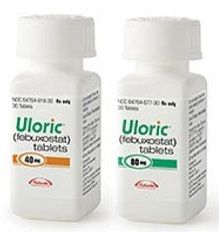Article
Black Box Blues for Gout Treatment Febuxostat
Author(s):
Aryeh M. Abeles, M.D., talks with Rheumatology Network about the FDA's black box label for febuxostat, a gout treatment which, according to the results of one clinical trial, was shown to be associated with an increased risk of mortality. In this Q&A, Dr. Abeles, says the decision was based on flawed data.
Fingers with gout (©Joloei,Shutterstock.com)

Dr. Abeles

Febuxostat (Uloric, Takeda Pharmaceuticals)

Earlier this year the U.S. Food and Drug Administration added a blackâbox warning on febuxostat (Uloric, Takeda Pharmaceuticals) due to an increased risk of death with the gout treatment. The conclusion was based on the results from the safety clinical trial CARES, which found an increased risk of heart-related death and death from all causes with febuxostat.
In an editorial recently published in ACR Open Rheumatology, Aryeh M. Abeles, M.D., and Michael Pillinger, M.D., from New York University and New York University Langone Medical Center, discussed why they met the FDA’s decision with disappointment.
In this Q&A, Dr. Abeles covers some takeaways from the editorial.
Why are you disappointed with the FDA's decision?
“The FDA's decision to include a black-box warning was based on one study whose conclusion â that febuxostat increases the risk of cardiovascular death â was undermined by flawed data.
“While the FDA's decision was based entirely on this one study, other studies have not replicated the finding. A recently-published retrospective study of a Medicare database showed no difference in all-cause mortality between about 25,000 patients who took febuxostat and 75,000 who took allopurinol; a subgroup analysis of patients at high risk for cardiovascular disease (CVD) within the overall cohort showed the same. A very recently-published prospective trial of high-CVD-risk patients (the Febuxostat for Cerebral and CaRdiorenovascular Events PrEvEntion StuDy, or the FREED trial) showed no difference in all-cause or cardiovascular mortality between those on febuxostat and those on allopurinol or no medication. Another large ongoing study, the Febuxostat vs. Allopurinol Streamlined Trial (FAST), largely mirrors the CARES study design and should be publishing its data soon. There is also a large VA study comparing febuxostat and allopurinol that may shed light on these issues.
“I fear, however, that regardless of any previous or future findings that might refute the notion that febuxostat increases the risk of cardiovascular death, the black box warning is here to stay. Appropriate long-term treatment of gout depends upon lowering serum uric acid, and â outside of allopurinol and febuxostat â we have very little left in the quiver to target high serum uric acid. Uricosuric drugs are not very effective, and pegloticase is an extraordinarily expensive medication that is appropriate for only the most severe of refractory gout cases.
“There is a fair amount of data that links untreated gout with cardiovascular disease and death, so the effect of this black-box warning may lead to non-treatment of some patients which, ironically, might increase their risk of death from cardiovascular disease.”
What are your concerns with the CARES study?
“CARES was plagued with a high dropout rate; a majority of patients didn't complete the trial. Only a small fraction of deaths in question occurred while on the study drug; about 90 percent of the reported deaths occurred after the study drugs (allopurinol and febuxostat) had already been discontinued. Imputing causality to a variable no longer present is a bit of a stretch.
“Lastly, when additional, non-adjudicated deaths among lost subjects who were identified by a search company were included, any difference in risk of death between allopurinol and febuxostat became statistically insignificant.”
Is there another move that the FDA should have made?
“They had already issued an alert about the CARES data almost a year earlier, and clinicians were aware. It would have been ideal for them to wait a little longer for the soon-to-be-released data from the FAST study, and to have considered the real-world data already available to them at the time of the decision.
“The black-box warning should also have been made explicitly for patients at high risk of cardiovascular disease, as this was the only population studied in the CARES trial.”
Overall, what are the most important points or take-away messages for providers?
“I agree with the FDA that allopurinol should be used as a first-line agent in almost all patients. The disagreement is why. Allopurinol is inexpensive, can be titrated up to 800 mg daily (in divided doses), and has never been demonstrated to be inferior to febuxostat except at allopurinol doses at or below 300 mg. That being said, there are a fair number of patients who don't tolerate allopurinol for any number of reasons, and a smaller number for whom it is ineffective. The FDA appropriately notes that febuxostat should be reserved for this population.”
Do you have anything else to add?
“Patients with gout have a disease that should be relatively easy to treat, but is often overlooked and mismanaged. My fear is that the FDA's decision to include this block-box warning â while clearly made with the intent to protect patients â may unintentionally hurt the very same population by making physicians fearful of prescribing an effective treatment.”
REFERENCE
Aryeh M. Abeles, Michael H. Pillinger. “Febuxostat and the Black Box Blues.” ACR Open Rheumatology. July 11, 2019. https://doi.org/10.1002/acr2.11047




